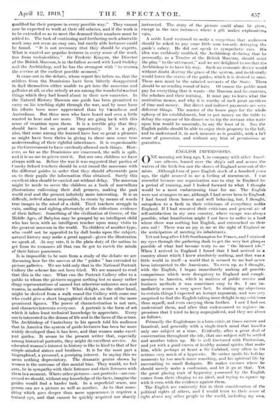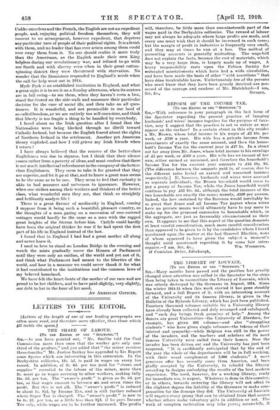ENGLISH IMPRESSIONS.
ONE morning not long ago, I, in company with other Ameri- can officers, leaned over the ship's rail and across the waters of the Irish Sea saw the shores of England ariseout of ths mists. Although I am of pure English stock of a hundred year« ago, the sight aroused in me a feeling of resentment. I was resentful because our organization was to stay in England for a period of training, and I looked forward to what I thought would be a most embarrassing time for me. The English were not strangers to me, although I had never been in England. I had found them honest and well behaving, but, I thought, outspokento a fault in their criticisms of everything unlike England. If I had resented their criticisms and general air of self-satisfaction in my own country, where escape was alwaya possible, what humiliation might I not have to suffer in a land where there was nothing but English, and entrenched on their own soil ! There was no joy- in me at the sight of England or the anticipation of meeting its inhabitants.
Yet not long after I left Southampton for France, and T strained my eyes through the gathering dusk to get time very last aliens, possible of what had become truly to me "the blessed isle." When I arrived in England I found that I had arrived in a country about which I knew absolutely nothing, and that was a little world in itself—a world that it seemed to me had never been interpreted to the Americans. To even up, as I thought, with the English, I began immediately making all possible comparisons which were derogatory to England and compli- mentary to America, which in matters of public service anti business methods it was sometimes easy to do. I ran im- mediately across a very queer fact. In stating my objections to certain things I expected an instant argument, and was very surprised to find the English taking more delight in my criticisms than myself, and even carrying them further. I saw I had not understood them, and after that endeavoured to register im- pressions that I tried to keep unprejudiced, and they are about as follows.
Primarily the Englishman is a born critic, at limes narrow and fanatical, and generally with a single-track mind that handles only one subject at a time. Evidently, after a great deal of conversation throughout the isle, that one subject will be settled and another taken up. He is well tinctured with Puritanism. and yet with a good excess of healthy animal spirits, that make him, while perhaps at heart a Sir Galahad, very often in his actions very much of a hypocrite. He rather spoils his holiday moments by too much inner searching, and his spiritual life by succumbing to small fleshpots. He makes excuses where he should merely make a confession, and let it go at that. Yet the great glaring trait of hypocrisy possessed by the English comes from their clinging to an ideal, and trying to square up with it even with the evidence against them.
The English are eminently fair in their consideration of the political rights of others, and I would trust to their sense of right above any other people in the world, including my owa. Unlike ourselves and the French, the English are not an expedient people, and, enjoying political freedom themselves, they will consent to no arrangement, however expedient, that deprives anyparticular race of people of their political rights. Ibis a fetish with them, and no leader that has over arisen among them could ever away them from it. No one should realize it more truly than the Americans, as the English made their own King helpless during our revolutionary war, and refused to go with our South and with slavery even when in their great cotton- spinning district they were threatened with starvation. No wonder that the Dominions responded to England's needs when the call for help wont out in 1914.
Hyde Park is an established institution in England, and what a great sight it is to see it on a Sunday afternoon, when its orators are in full suing—to see them, when they haven't even a box, stand fiat-footed on the side-walk and announce their particular doctrine for the cure of social ills, and than take on all ques- tioners. It is wonderful, and not permissible in our land of so-called freedorn,as we are entirely too self-conscious,and think that liberty is too fragile a thing to be handled by everybody.
I faced about on the Irish question after I found that the Nationalists were being blocked through no illwill toward Catholic Ireland, but because the English feared about the rights of Northern Ireland in the settlement. Another pet American theory exploded, and how I will grieve my Irish friends when I return !
I have always believed that the reserve of the better-class Englishmen was due to shyness, but I think that their silence comes rather from a poverty of ideas, and must confess tlaatthere
b not much intellectual refreshment in the company of the better- class Englishmen. They seem to take it for granted that they are superior, and let it go at that, and to know a great man seems to be the same as to be one. They seem to feel that curiosity is akin to bad manners and navveness to ignorance. However, when one strikes among their workers and thinkers of the better class, what wonderful men they are, that think so straightly and brilliantly analyse life !
There is a great flavour of mediocrity in England, coming I suppose from it being such a beautiful, pleasant country, as the thoughts of a man gazing on a succession of rose-covered cottages would hardly be the same as a man with the ragged great heights of the Sierras before him. Carlyle could hardly have been the original thinker he was if ho had spent the first part of his life in England instead of the last.
I found that in England I had had a great mother all along and never knew it.
I used to love to stand an London Bridge in the evening and watch the mists gradually cover the Houses of Parliament until they were only an outline, of the world and yet not of it, and think what Parliament had meant to the liberties of the world, and how in a measure we could never thank it for what it had contributed to the institutions and the common laws of any beloved homeland.
We have felt the heart-beats of the mother of our race and are proud to be her children, and to have paid slightly, very slightly, our debt to her in the hour of her need.
AN AMERICAN OFFICER.




































 Previous page
Previous page